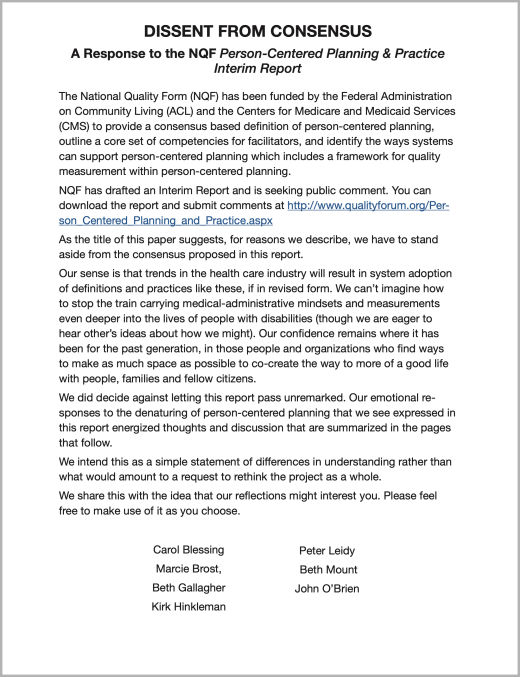Bureaucracies and regulatory control systems undermine important social innovations such as person-centred planning.
Authors: Carol Blessing, Marcie Brost, Beth Gallagher, Kirk Hinkleman, Peter Leidy, Beth Mount & John O’Brien
This short paper, written in response to a technical change in US regulations for Medicaid (the system that funds most disability services in the USA), may seem irrelevant to the concerns of those of working in other countries.
But it is not irrelevant; it’s a profoundly relevant expression of our ongoing efforts to live as citizens and to escape the growing ‘cogworld’ of systems and regulations that aim to control us for our own good.
The authors are some of the leading designers, thinkers and practitioners behind the brilliantly helpful concept of person-centred planning. Person-centred planning is a way of thinking, listening and facilitating that has inspired positive change in the lives of people with intellectual disabilities (in US terminology people with developmental disabilities) and many more. However putting such an approach into the hands of a bureaucracy has had a profoundly negative impact.
For instance, as the authors put it:
“The Interim Report puzzles us by enumerating an exhaustive list of facilitator competencies. None are objectionable but the collection as a whole is daunting. Although we have practiced for years, often with good results, none of us could claim all these proficiencies. In a complicated world, the qualities of a good facilitator seem to us a simple matter. Someone who approaches people with deep respect, presumes competency and seeks possibility, listens with curiosity and compassion, finds a way to host conversations that suits them and learns to do a bit better with each experience, encourages deliberate action, and only makes promises they can keep will be a good enough facilitator. These are qualities of character and commitment to learning that are passed on through membership in communities of practice rather than transmitted through curricula.”
There is a dual puzzlement here. The innovators are puzzled that the bureaucracy believes it can convert a shared human craft into a set of rules to be followed, incentivised and double-checked. The bureaucracy is puzzled because that is the only way it knows how to implement good practice. This paper is not quite an elegy for person-centred planning - its value and practice will continue in the hands of those who love and understand it. But it is perhaps an elegy for the seeming impossibility of human beings and social movements to engage intelligently with bureaucracies. The authors can see that once the system has decided to ‘incorporate’ person-centred planning within their system they seem incapable of respecting its true nature. It is like trying to write rules for Van Gogh - an impossible contradiction.
In the UK we have a different system, and our system’s dalliance with person-centred planning is now in the past. Now abusive institutions, regulated by our national regulator, talk easily about person-centredness and person-centred plans. They see no contradiction between abusive and isolating congregate care services and the idea of being ‘person-centred’. Governmental enthusiasm for person-centred planning has helped make a small number of person-centred planning trainers wealthy, selling other people’s work as their own, but we are now back in the desert, trying to figure out how to start again.
One conclusion we might draw from these contradictions and challenges is the importance of building our own community to share, develop and protect helpful practices from thoughtless bureaucracies and those who seek to sell them.
Read and download the free pdf in your browser, link below.

The publishers are Carol Blessing, Marcie Brost, Beth Gallagher, Kirk Hinkleman, Peter Leidy, Beth Mount & John O’Brien.
Dissent from Consensus © Carol Blessing, Marcie Brost, Beth Gallagher, Kirk Hinkleman, Peter Leidy, Beth Mount & John O’Brien 2019.
All Rights Reserved. No part of this paper may be reproduced in any form without permission from the publisher except for the quotation of brief passages in reviews.
health & healthcare, local government, Person-Centred Planning, social care, USA, Paper